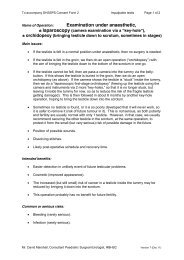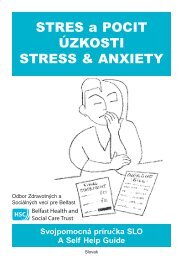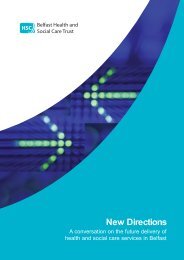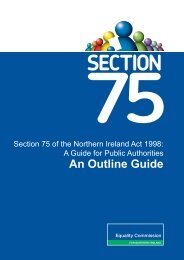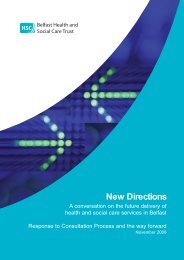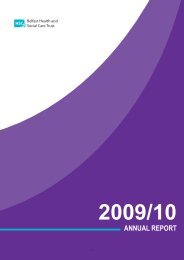Stress & Anxiety - Belfast Health and Social Care Trust
Stress & Anxiety - Belfast Health and Social Care Trust
Stress & Anxiety - Belfast Health and Social Care Trust
Create successful ePaper yourself
Turn your PDF publications into a flip-book with our unique Google optimized e-Paper software.
“Bad with your nerves”“A worrier”“<strong>Stress</strong>ed out”“Unable to relax”“Tense <strong>and</strong> nervous”... Are all words we might use to describe someone who has a problemwith anxiety. If someone has too much stress for too long anxiety is veryoften the result. This booklet is about anxiety, <strong>and</strong> aims to help you to:1. Recognise whether or not you may be suffering from symptoms ofanxiety.2. Underst<strong>and</strong> what anxiety is, what can cause it, <strong>and</strong> what can keep itgoing.3. Overcome your anxiety by learning better ways of coping with it."I’m sure that I'llfail the exam.""I’m tired, butcan't sleep forworrying.""My work ispiling up <strong>and</strong> Ijust can't copehowever hard Itry.""I’m losing control."2
Isn't it normal to feel anxious?<strong>Anxiety</strong> is something we all experience from time to time. It is a normalresponse to situations that we see as threatening to us. For example, ifwe had to go into hospital for an operation, or had to sit a driving test, ortake an exam, it would be natural to feel anxious. <strong>Anxiety</strong> at certain levelscan even be helpful in some situations such as when we need to performwell, or cope with an emergency.Some anxiety is not at all helpful because: Symptoms of anxiety whilst not dangerous, can be uncomfortable. Symptoms can also be frightening particularly if someone does notknow that these symptoms are just signs of anxiety. Sometimes people with anxiety symptoms worry that they may havesomething seriously wrong with them. This worry can then producemore anxiety symptoms which of course increases the worry! When anxiety is severe <strong>and</strong> goes on for a long time it can stop peopledoing what they want to do.Am I suffering from anxiety? “I worry about everything, I get tense <strong>and</strong> wound up, <strong>and</strong> end upsnapping at the children”. “Even before I get there I start to worry about all the things that mightgo wrong. When I arrive my heart starts to pound, my legs turn to jelly<strong>and</strong> I just know I’m going to make a fool of myself. I have to get out”. “It feels as though there is something in my throat. My mouth is dry<strong>and</strong> I can’t swallow properly <strong>and</strong> then I begin to get panicky. I think I’mgoing to stop breathing. My mind starts to race, I feel like I’m going to lose control <strong>and</strong> go mador something”.These are some typical experiences of people who suffer from anxiety. Ifyou are suffering from anxiety you may have thoughts like these yourself.Sometimes it is possible to be suffering from anxiety <strong>and</strong> not even knowit, particularly if you don’t think of yourself as an anxious person. Peopleoften mistake symptoms of anxiety for a physical illness. Therefore, thefirst step in learning to deal with anxiety is recognising whether anxietyis a problem for you.3
<strong>Anxiety</strong> can affect us in at least four different ways. Itaffects: The way we feel. The way our body works. The way we think. The way we behave.In order to check out whether you may be suffering from anxiety, place atick next to those symptoms you experience regularly:How you feel Anxious, nervous, worried,frightened Feeling, something dreadful isgoing to happen Tense, stressed, uptight, onedge, unsettled Unreal, strange, woozy,detached PanickyHow you think Constant worrying Can’t concentrate Thoughts racing Mind jumping from one thing toanother Imagining the worst <strong>and</strong> dwellingon itCommon thoughts “I’m losing control” “I’m cracking up” “I’m going to faint” “My legs are going to collapse” “I’m going to have a heartattack” “I’m going to make a fool ofmyself” “I can’t cope” “I’ve got to get out”What happens to your body Heart pounds, races, skips abeat Chest feels tight or painful Tingling or numbness in toes orfingers Stomach churning or“butterflies” Having to go to the toilet Feeling jumpy or restless Tense muscles Body aching Sweating Breathing changes Dizzy, light headedWhat you do Pace up <strong>and</strong> down Start jobs <strong>and</strong> not finish Can’t sit <strong>and</strong> relax On the go all of the time Talk quickly or more than usual Snappy <strong>and</strong> irritable behaviour Drinking more Smoke more Eat more (or less) Avoid feared situationsIf you are regularly experiencing some or all of these symptoms, then it islikely that you are suffering from anxiety.4
What is anxiety?<strong>Anxiety</strong> is the feeling we get when our body responds to a frightening orthreatening experience. It has been called the fight or flight response. It issimply your body preparing for action either to fight danger or run awayfrom it as fast as possible. The purpose of the physical symptoms ofanxiety therefore is to prepare your body to cope with threat. Tounderst<strong>and</strong> what is happening in your body, imagine that you are about tobe attacked. As soon as you are aware of the threat your muscles tenseready for action. Your heart beats faster to carry blood to your muscles<strong>and</strong> brain, where it is most needed. You breathe faster to provide oxygenwhich is needed for energy. You sweat to stop you body overheating. Yourmouth becomes dry <strong>and</strong> your tummy may have butterflies. When yourealise that the “attacker” is in fact a friend, the feelings die away, but youmay feel shaky <strong>and</strong> weak after the experience.The fight or flight response is a really basic system that probably goesback to the days of cave men, <strong>and</strong> is present in animals who depend on itfor their survival. Fortunately, nowadays we are not often in such life ordeath situations, but unfortunately many of the stresses we do face can’tbe fought or run away from, so the symptoms don’t help. In fact they oftenmake us feel worse, especially if we don’t underst<strong>and</strong> them.What causes anxiety? There may be many reasons why someone becomes anxious. Some people may have an anxious personality <strong>and</strong> have learned toworry. Others may have a series of stressful life events to cope with, forexample bereavements, redundancy, divorce. Others may be under pressure, at work, or home, for example,because of family problems or bills.5
What keeps anxiety going?Sometimes anxiety can go on <strong>and</strong> on, <strong>and</strong> become a life long problem.There can be a number of reasons for this:1. If someone has an anxious personality <strong>and</strong> is a worrier, then they willprobably be in the habit of feeling anxious.2. Sometimes people have ongoing stresses over a number of yearswhich means they develop the habit of being anxious.3. Vicious circle of anxiety - as the bodily symptoms of anxiety can befrightening, unusual <strong>and</strong> unpleasant, people often react by thinking thatthere is something physically wrong, or that something truly awful isgoing to happen. This in itself causes more symptoms, <strong>and</strong> so avicious circle develops.Feel anxiousThoughts“Now I really amin dangerThoughts“Something awfulis going tohappen to me”Feel bodily symptomsHeart pounding,breathing speeds up4. “Fear of Fear” - Someone who has experienced anxiety in a certainsituation may start to predict feeling anxious, <strong>and</strong> become frightened ofthe symptoms themselves, this in turn actually causes the verysymptoms that are feared.Fear of anxioussymptoms coming onCauses bodilysymptoms6
5. Avoidance -once a vicious circle has developedwith lots of anxious thoughtsincreasing the anxiety symptoms,avoidance is often used as a way ofcoping. It is natural to avoidsomething that is dangerous, butthe sorts of things that people tendto avoid when they suffer fromanxiety are most often not realdangers but busy shops, buses,crowded places, eating out, talkingto people etc. Not only are thesethings not dangerous, but they arequite necessary. Avoiding them canmake life very inconvenient <strong>and</strong>difficult. This sort of avoidance canalso result in a great loss ofconfidence which can affect howgood you feel about yourself, whichin turn makes you feel moreanxious - another vicious circle!To summarise: <strong>Anxiety</strong> is often the body’s response to stress, although some of usmay be a bit more prone to anxiety <strong>and</strong> worry than others. When we are suffering from anxiety, whilst it can be unpleasant it isour body’s normal response to threat or danger <strong>and</strong> is not dangerous. <strong>Anxiety</strong> symptoms are part of the fight or flight response <strong>and</strong> areintended to be helpful in spurring us into action.<strong>Anxiety</strong> becomes a problem when the symptoms are:- severe <strong>and</strong> unpleasant;- going on too long;- happening too often;- causing us to worry that there is something seriously wrong;- stopping us doing what we want to do. <strong>Anxiety</strong> often becomes a vicious circle where our symptoms, thoughts<strong>and</strong> behaviour keeps the anxiety going.7
Now spend a few moments trying to write down any of these ways thatyour anxiety may be being kept going.1) unpleasant/frightening symptoms you experience;2) your beliefs <strong>and</strong> thoughts about these symptoms;8
3) everyday things that you are avoiding;4) current stresses in your life.9
How Can I Manage My <strong>Anxiety</strong> Better?As we have learned, anxiety is not an illness <strong>and</strong> so can’t be cured. If wecan break into the vicious circle, however, we can learn ways of reducingour anxiety <strong>and</strong> getting it to be more manageable. We can work on atleast four different areas:1. Underst<strong>and</strong>ing our anxiety better.2. Reducing physical symptoms.3. Altering our thoughts related to anxiety.4. Changing our behaviours related to anxiety.1. Underst<strong>and</strong>ing <strong>Anxiety</strong> - You may already by now have some ideasabout what is causing your anxiety. The following sections will giveadvice on how to break out of the vicious circle that keeps anxietygoing. Before you can do this though, it is really useful for you tounderst<strong>and</strong> your own anxiety better. Is your anxiety related to certainsituations, places or people, is it worse at particular times of the day,are there realistic worries you have that would make anyone anxious?The following two exercises should help you to underst<strong>and</strong> your anxietybetter.i) <strong>Anxiety</strong> Diary - for a period of two weeks (or longer if you prefer) keepan hourly diary of your anxiety <strong>and</strong> activity level. Rate your anxietyfrom 0-10. Note down anything that seems important. Were you atwork or home, who were you with, what were you doing, what were youthinking about? You may start to become more aware of situations thatmake you anxious or that you may even be avoiding. What is yourgeneral level of stress like? This information will help you begin totackle your anxiety.ii) If you become aware that you have a realistic worry or problem thatyou feel may be causing you anxiety, a problem solving approachmay help.A good way to begin is to write down a problem. Define it as clearly asyou can, for example “I never have any money”, is too vague,something like “I owe £3000 to different credit card companies”, ismore helpful. Next, write down as many possible solutions as you can.It doesn’t matter how silly you may think the solutions are, the point isto think of as many as you can. Try to think how you have solved10
similar problems in the past. Ask a friend what they might do. Think toyourself what you might advise a friend to do if they had the sameproblem, eg possible solutions:- get all debts on one loan with less interest;- agree on affordable payments;- see a debt counsellor;- get a part time job;- sell car.If you have a problem that may be making you anxious, try writing itbelow:Now list as many possible solutions as you can:Choose what seems like the best solution <strong>and</strong> write down all the steps itwould take to achieve that solution. Who might help?, What might gowrong? often it is helpful to think, “What is the worst thing that couldhappen?” If you can think of a plan to cope with this, your anxiety mightreduce.If you are trying to come up with a plan to tackle a problem that has beenworrying you for some time, it is often helpful to discuss this with a friendor even your doctor.11
<strong>Stress</strong>ful lifestyle - general tipsNowadays life is often stressful, <strong>and</strong> it is easy for pressures to build up.We can’t always control the stress that comes from outside but we canfind ways to reduce the pressure we put on ourselves: Try to identify situations you find stressful by noticing the beginnings oftension. Take steps to tackle what it is about these situations that you findstressful. Make sure you have time for things you enjoy. Take up a relaxing hobby. Make sure you get enough sleep. Eat a well balanced diet. Take regular exercise. Learn to relax.2. Reducing Physical Symptoms - RelaxationIn order to reduce the severity of physical symptoms it is useful to “nipthem in the bud”, by recognising the early signs of tension.Once you have noticed early signs of tension you can prevent anxietybecoming too severe by using relaxation techniques”. Some people canrelax through exercise, listening to music, watching TV, or reading a book.For others it is more helpful to have a set of exercises to follow. Somepeople might find relaxation or yoga classes most helpful, others findtapes useful. You can obtain a relaxation tape from your GP, <strong>and</strong> there arealso a wide number of relaxation tapes available in the shops.Relaxation is a skill like any other which needs to be learned, <strong>and</strong> takestime. The following exercise teaches deep muscle relaxation, <strong>and</strong> manypeople find it very helpful in reducing overall levels of tension <strong>and</strong> anxiety.Deep muscle relaxation - it is helpful to read the instructions first <strong>and</strong> tolearn them eventually. Start by selecting quite a warm, comfortable placewhere you won’t be disturbed. Choose a time of day when you feel mostrelaxed to begin with. Lie down, get comfortable, close your eyes.Concentrate on your breathing for a few minutes, breathing slowly <strong>and</strong>calmly: in two-three <strong>and</strong> out two-three. Say the words “calm” or “relax” toyourself as you breathe out. The relaxation exercise takes you through12
different muscle groups, teaching you firstly to tense, then relax. Youshould breathe in when tensing <strong>and</strong> breathe out when you relax. Startingwith your h<strong>and</strong>s, clench one first tightly. Think about the tension thisproduces in the muscles of your h<strong>and</strong> <strong>and</strong> forearm.Study the tension for a few seconds <strong>and</strong> then relax your h<strong>and</strong>. Notice thedifference between the tension <strong>and</strong> the relaxation. You might feel a slighttingling, this is the relaxation beginning to develop.Do the same with the other h<strong>and</strong>.Each time you relax a group of muscles think how they feel when they’rerelaxed. Don’t try to relax, just let go of the tension. Allow your muscles torelax as much as you can. Think about the difference in the way they feelwhen they’re relaxed <strong>and</strong> when they’re tense. Now do the same for theother muscles of your body. Each time tense them for a few seconds <strong>and</strong>then relax. Study the way they feel <strong>and</strong> then let go of the tension in them.It is useful to stick to the same order as you work through the musclegroups: H<strong>and</strong>s - clench first, then relax. Arms - bend your elbows <strong>and</strong> tense your arms. Feel the tensionespecially in your upper arms. Remember, do this for a few seconds<strong>and</strong> then relax. Neck - press your head back <strong>and</strong> roll it from side to side slowly. Feelhow the tension moves. Then bring your head forward into acomfortable position. Face - there are several muscles here, but it is enough to think aboutyour forehead <strong>and</strong> jaw. First lower your eyebrows in a frown. Relaxyour forehead. You can also raise your eyebrows, <strong>and</strong> then relax. Now,clench your jaw, notice the difference when you relax. Chest - take a deep breath, hold it for a few seconds, notice thetension, then relax. Let your breathing return to normal. Stomach - tense your stomach muscles as tight as you can <strong>and</strong> relax. Buttocks - squeeze your buttocks together, <strong>and</strong> relax. Legs - straighten your leges <strong>and</strong> bend your feet towards your face.Finish by wiggling your toes.13
You may find it helpful to get a friend to read the instructions to you. Don’ttry too hard, just let it happen.To make best use of relaxation you need to: Practice daily. Start to use relaxation in everyday situations. Learn to relax without having to tense muscles. Use parts of the relaxation to help in difficult situations, eg breathingslowly. Develop a more relaxed lifestyle.This relaxation exercise is available on tape from your GP.Remember relaxation is a skill like any other <strong>and</strong> takes time to learn.Keep a note of how anxious you feel before <strong>and</strong> after relaxation, ratingyour anxiety 1-10.Controlled BreathingOver-breathing: it is very common when someone becomes anxious forchanges to occur in their breathing. They can begin to gulp air, thinkingthat they are going to suffocate, or can begin to breathe really quickly.This has the effect of making them feel dizzy <strong>and</strong> therefore more anxious.Try to recognise if you are doing this <strong>and</strong> slow your breathing down.Getting into a regular rhythm of in two-three <strong>and</strong> out two-three will soonreturn your breathing to normal. Some people find it helpful to use thesecond h<strong>and</strong> of a watch to time their breathing. Other people have foundbreathing into a paper bag or cupped h<strong>and</strong>s helpful. For this to work youmust cover your nose <strong>and</strong> mouth.It takes at least three minutes of slow breathing or breathing into a bagfor your breathing to return to normal.DistractionIf you take your mind off your symptoms you will find that the symptomsoften disappear. Try to look around you. Study things in detail, registrationnumbers, what sort of shoes people are wearing, conversations. Again,you need to distract yourself for at least three minutes before symptomswill begin to reduce.14
Whilst relaxation, breathing exercises <strong>and</strong> distraction techniques can helpreduce anxiety it is vitally important to realise that anxiety is not harmfulor dangerous. Even if we did not use these techniques, nothing awfulwould happen. <strong>Anxiety</strong> cannot harm us, but it can be uncomfortable.These techniques can help reduce this discomfort.3. Altering your Thoughts Related to <strong>Anxiety</strong>We have seen the role that thoughts have in keeping going the viciouscircle of anxiety. Sometimes there may also be pictures in your mind.To give an example, imagine you are running for a bus one day. All of asudden you get a pain in your chest <strong>and</strong> feel really breathless. Thethought goes through your mind, “Ism having a heart attack”. This thoughtis of, course, very frightening, <strong>and</strong> so your heart starts to beat fasterwhich makes you think “there really must be something wrong with myheart”. You may very well have a picture of the ambulance on its way <strong>and</strong>you on a stretcher.Now think about the following questions <strong>and</strong> write down the answers:1) What are the thoughts that most often go through your mind when youfeel anxious?2) Do you have any pictures of what might happen?3) Are there any thoughts that make you feel worse?15
It isn’t always that easy to know what you are thinking that is making youranxiety worse.The sort of thoughts that make people anxious can come <strong>and</strong> go in aflash, <strong>and</strong> may be so much of a habit that they are automatic. They maybe so familiar that they just feel like part of you.Try to keep a diary over the course of two weeks. Write down your ownthoughts in situations where you are anxious.Now, try to imagine the last time you felt very anxious. Try to run throughit like a film, in as much detail as you can. See if you can write down anyfrightening thoughts now.Remember any thoughts can count. No thought is too small or too silly.Even “oh no” or “here we go again” can increase tension <strong>and</strong> anxiety.Some thoughts are like unpleasant pictures in your mindFrightening thoughts:Once you know what it is you are thinking, you can begin to fight back,<strong>and</strong> break the vicious circle.16
In particular, ask yourself:1. Am I exaggerating, eg “everything is bound to go wrong it alwaysdoes”.2. Am I jumping to conclusions, eg “I have a pain in my chest thereforeit must be my heart”.3. Am I focusing just on the bad things, eg “I had a really bad dayyesterday” (ignoring that this followed a few good days).Use these questions to help yourself answer back. A good way of doingthis is to write two columns - one for your thoughts that make you anxious,<strong>and</strong> the other for a more balanced thought, eg:Anxious ThoughtThe dizzy feeling means Ismgoing to faint.I’m going mad.Balanced ThoughtI have had it many timesbefore <strong>and</strong> have not fainted.I have fainted once <strong>and</strong> thatfelt really different.I have not gone mad yet, <strong>and</strong> thedoctor tells me anxiety is notmadness.Write down some of your thoughts now <strong>and</strong> write as many answers asyou can. This question might also help. What would you say to a friendwho was thinking that way?The aim is to get faster at “catching” these anxious thoughts <strong>and</strong>answering back almost instantly. It takes a lot of practice, but really doeswork.4. Changing Behaviour Related to <strong>Anxiety</strong> Try to recognise when you are avoiding things <strong>and</strong> wherever possibletry to tackle these fears, not all at once but in a gradual way. Set yourself very small goals. Write down here goals that you wouldlike to tackle. Start with the easiest first <strong>and</strong> tick off any activity youachieve. People often get into the habit of escaping from situations that makethem anxious. Instead of escaping try gradually to increase how long17
you stay in a situation that makes you anxious. <strong>Anxiety</strong> often reaches apeak, then starts to go away naturally. If you stay in an anxioussituation what do you predict will happen to your anxiety? People oftenthink it will just keep getting worse <strong>and</strong> worse. This is not the case. Itwill start to come down. People not only avoid situations <strong>and</strong> try to escape, they also often dothings to make themselves feel more safe, eg hanging on to ashopping trolley, lying down. These “safety behaviours” may help at thetime, but they also help to keep the anxiety going because the anxiousperson never learns that nothing awful would have happened even ifthe trolley wasn’t there. Also, imagine how frightening it would be if notrolley was available. Try to do things to test out whether your anxious thoughts are realistic,eg “would I really faint if I didn’t get out?”It really is very important to recognise that the more you avoid something,the more difficult it will seem to overcome, which will in turn make youmore anxious.What Treatment is Available for <strong>Anxiety</strong>? Most people with anxiety can benefit from self help such at this leaflet. Your family doctor, health visitor or practice nurse may also be able togive you further help in dealing with anxiety. Occasionally, doctors prescribe tablets for anxiety. There should onlybe taken for short spells to get over specific anxiety provokingsituations. Your doctor may also refer you to a mental health worker or counsellorif your anxiety does not respond to self-help alone. <strong>Anxiety</strong> Management Groups or classes are often run in local surgeriesor Community <strong>Health</strong> Centres. Please let your doctor know if youwould be interested in such classes.Where Can I Find Help if I Think I Am Suffering From<strong>Anxiety</strong>?First, we hope you will use the advice in this booklet. You should find ithelpful. If having used the booklet you feel you need more help, youshould discuss this with your GP, who will tell you about alternativetreatments <strong>and</strong> local services. There are a number of self help books that18
other people have found helpful. These books may be available from yourlocal library.Helen Kennerley: (1997) Overcoming <strong>Anxiety</strong>. Robinson LondonDavid Burns: (1980) The Feeling Good H<strong>and</strong>book. New American LibraryDr Clare Weeks: Self Help for your Nerves.Susan Jeffers: Feel the Fear <strong>and</strong> Do it Anyway.The following organisations <strong>and</strong> help lines may also be useful: CRUSE Bereavement Line - help line for bereaved people <strong>and</strong> thosecaring for bereaved people, telephone: 0870-1671677 Mind Info line: 08457 660163. National Debt Line - help for anyone in debt or concerned they mayfall into debt, telephone: 0808 8084000 (freephone). Relate - help with marital or relationship problems:telephone: 0845 130 4010 (local rate). No Panic - National Self Help Organisation for phobias, anxiety, panic.Help line: 01952 590545. Office: 01952-590005. NHS Direct. A free 24 hour helpline. Calls charged at local rate:0845-4647Different Sorts of <strong>Anxiety</strong>This leaflet has tackled generalised anxiety. There are other more specificanxieties, <strong>and</strong> also other problems associated with anxiety. Some of thefollowing leaflets may be also useful. <strong>Social</strong> anxiety - fear of being with people. Obsessive Compulsive Disorders - having to do things over <strong>and</strong> over. Panic Disorder - suffering from frequent severe anxiety attacks whichcome out of the “blue”. Depression - low mood <strong>and</strong> lack of energy. Dealing with stress.These leaflets may be available in your local surgery from:Your Doctor, <strong>Health</strong> Visitor, Practice Nurse, District Nurse or Receptionist.If you feel you may have a problem - please ask!19
Designed by The Department of Design <strong>and</strong> Communication© Newcastle, North Tyneside <strong>and</strong> Northumberl<strong>and</strong>Mental <strong>Health</strong> NHS <strong>Trust</strong>(Revised January 2002)



